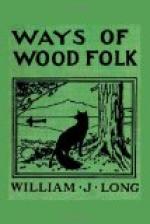Now all that was pure acting. A lynx likes beaver meat better than anything else; and this fellow had caught some of the colony, no doubt, in the well-fed autumn days, as they worked on their dam and houses. Sharp hunger made him remember them as he came through the wood on his nightly hunt after hares. He knew well that the beavers were safe; that months of intense cold had made their two-foot mud walls like granite. But he came, nevertheless, just to pretend he had caught one, and to remember how good his last full meal smelled when he ate it in October.
It was all so boylike, so unexpected there in the heart of the wilderness, that I quite forgot that I wanted the lynx’s skin. I was hungry too, and went out for a sniff at the ventilator; and it smelled good. I remembered the time once when I had eaten beaver, and was glad to get it. I walked about among the houses. On every dome there were lynx tracks, old and new, and the prints of a blunt nose in the snow. Evidently he came often to dine on the smell of good dinners. I looked the way he had gone, and began to be sorry for him. But there were the beavers, safe and warm and fearless within two feet of me, listening undoubtedly to the strange steps without. And that was good; for they are the most interesting creatures in all the wilderness.
Most of us know the beaver chiefly in a simile. “Working like a beaver,” or “busy as a beaver,” is one of those proverbial expressions that people accept without comment or curiosity. It is about one-third true, which is a generous proportion of truth for a proverb. In winter, for five long months at least, he does nothing but sleep and eat and keep warm. “Lazy as a beaver” is then a good figure. And summer time—ah! that’s just one long holiday, and the beavers are jolly as grigs, with never a thought of work from morning till night. When the snow is gone, and the streams are clear, and the twitter of bird songs meets the beaver’s ear as he rises from the dark passage under water that leads to his house, then he forgets all settled habits and joins in the general heyday of nature. The well built house that sheltered him from storm and cold, and defied even the wolverine to dig its owner out, is deserted for any otter’s den or chance hole in the bank where he may sleep away the sunlight in peace. The great dam, upon which he toiled so many nights, is left to the mercy of the freshet or the canoeman’s axe; and no plash of falling water through a break—that sound which in autumn or winter brings the beaver like a flash—will trouble his wise little head for a moment.




